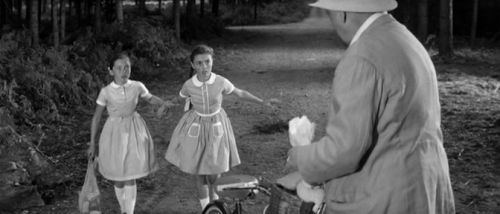Hammer-Rama: Never Take Sweets From a Stranger, by Alexander Miller
Going through the library of Hammer films, I wanted to break from their reputation as purveyors of macabre thrillers, victorian horror, and tales of science fiction. At times I find myself at odds with the reductive attitude towards a studio whose infamy rose from making superior genre films. So instead of just taking Hammer seriously, I thought I would find the most serious Hammer film out there. And boy are they out there. This is what led me to revisit a strange but compelling drama that can’t be categorized alongside anything else in their output. It doesn’t stray so far from their modus operandi, but the distinction is revealing. Previously in this series, we’ve looked at Hammer films dealing with famous movie monsters – your phantoms, your frankensteins, your mummies. Never Take Sweets from a Stranger (or Never Take Candy from a Stranger) deals with a very real type of monster – a child molester.
The film is centered in a Canadian suburb, a new home for the Carter family, who’s recently moved from England where Peter Carter has been hired as the school principal. This sleepy town and its local populace warm up to their new residents and life is looking nice for he, wife Sally, and nine-year-old daughter Jean. Jamestown life seems bright but that quaint veneer is smothered once they learn that Jean and her friend Lucille have been victimized by a wealthy and prestigious elder of the town’s most powerful family. The perpetrator is the ghoulish senior of the prestigious Olderberry family who reign over Jamestown with their reputation and power; people support that the Olderberry’s are untouchable and that legal action is fruitless.
Never Take Sweets from a Stranger is a lot of solid components bound together by some even stronger narrative bricklaying that is partially bulldozed by a melodramatic final confrontation, treating the allegorical monster as a literal one. I tried to reconcile this miscalculated ending as being the byproduct of the studio’s reputation for delivering more “traditional” scares, but the residual import feels like it was made at a time when overemphatic devices didn’t stand out so much as they do now.
Despite this clumsy endcap, the pros outweigh the cons as Never Take Sweets from a Stranger incorporates itself into a courtroom drama, without hammering anything too hard. Some familiar Hammer players appear – Michael Gwynn (Scars of Dracula, Revenge of Frankenstein) is a stately prosecutor – but the strongest performances come from child actor Janina Faye. The demanding urgency and range of her performance is astounding. Felix Aylmer is equally memorable as Clarence Olderberry, playing the warped pedophile as if he was a mute Noah Cross, a malevolent man-child with sunken eyes. Aylmer is a terrific character actor lends an impressive performance without uttering a word. Although American expat Joseph Losey was considered as director, Hammer opted for Cyril Frankel with the hopes that he could channel his documentary-honed eye for realism into the film.
Wandering into this movie, you have to ask yourself a few baseline questions about the film’s approach to the eternally sensitive subject of child molestation; when you enter this territory, your film could either be preachy, exploitative, or self-congratulatory. With a name that sounds like an after school special from a studio known especially for lusty, X-rated horror movies, Never Take Sweets from a Stranger was an unlikely but gratifying dramatic film that bravely navigates the impossibly dangerous subject matter.
As much as I admired the thematic tuning and mature craftsmanship I can’t help but wonder how, and why did a project like this come to fruition? Who stood up and said, “I’m going to cull my resources, and make a movie about a child predator!” At this point, executive producer Michael Carreras was weary of horror films and by 1960 was a proponent for stepping outside the proverbial box that made Hammer a household name. With a growing body of distribution deals, Never take Sweets from a Stranger was a co-production with Columbia. Of course, the film was a flop, and due to the studio’s reputation for being a factory of horror audiences and critics accused Hammer of exploiting the material to turn a profit. But the film lives on, and it’s easier with the distance of fifty-some years to see it earns a substantial place as a culturally significant and important film from a studio that bore endless criticisms for being immoral and depraved.





























